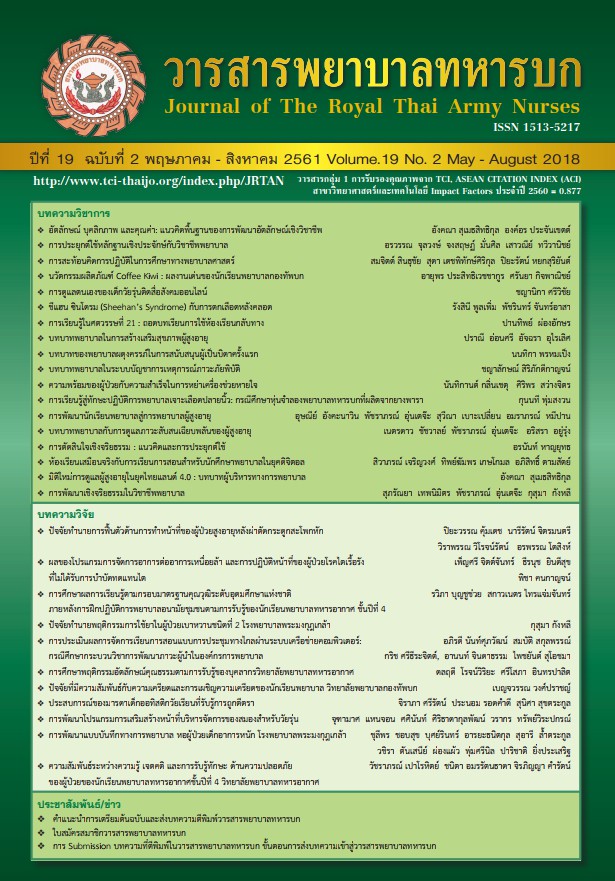New Perspective of Elderly Care in Thailand 4.0 Era: Roles of Nursing Administrations
Keywords:
New Perspective, Elderly Care, Thailand 4.0 Era, Nursing AdministrationsAbstract
The global trend is moving towards the “aging century” which is the era of advanced technologies and an aging society. Thus, connecting elderly care and technology by application of current knowledge in real aging care are essential. The recent status of aging society causes fragility in health care problems related to this age group such as lack of caregivers. The rapidly increasing proportion of older adults results in a significant change in the population’s economic dependency. Further, aging people in Thailand 4.0 era have great experiences and available advanced healthcare and medications, reducing the mortality rate and improving quality of life and longevity. Thailand is also turning to the aging society with a rapid increase in the aging population. In 2015, approximately 11 out of 65.1 million people were aged 60 and older, accounting for 16% of the total population. The change in the population structure unavoidably impacts the economy and society. The potential consequences include physical limitations, and high risks of chronic diseases, morbidities, and dependency. Therefore, caring for elderlies in this era requires an adequate understanding of the current state of elderly care, environment and their lifestyles in reality. Additionally, positive thinking and a meaningful-life attitude are crucial to support older people to maintain peace of mind, mental security and live a happy life with proper life purposes.
Downloads
References
2. Prompak C.Aging society in Thailand. Bangkok. Academic Office Secretary of the Senate. 2013. (in Thai).
3. Kespichayawattana J, & Sutthichai j. Health Care System for Older Persons. AgeingInt. 2009.33: (28–49). (in Thai).
4. Saisat S, Khamdee P, and Phakdeeprom T. Development of quality assurance model Senior Care Assistant. Nursing Council j. 2010; 25(1): January – March.(in Thai).
5. Charoenpun J. and Tansakul C. Health Behavior, Faculty of Public Health : Mahasarakham University ; 2007. (in Thai).
6. Koshakri R, Kasemsuk W, Rerkluenrit J. The outcomes of program for improvement of Health Volunteer’s Ability in Educational Home Visit for Diabetes People without Complication in Communities. Journal of The Royal Thai Army Nurses. 2014; 17(1): 141-147 (in Thai).
7. Artsanthia J.,Pomthong R. The trend of Elderly Care in 21st Century : Challenging in Nursing Care. Journal of The Royal Thai Army Nurses. 2018; 19(1): 39-46. (in Thai).
8. Sinchaiwanichakul C., Kespichayawattana J. Factors Related to Healthy Aging Among The Older Persons in Community-Dwelling of Bangkok Metropolitan. Journal of The Royal Thai Army Nurses. 2018; 19 (Supplement) January-April: 101-147 (in Thai).
Downloads
Published
How to Cite
Issue
Section
License
บทความหรือข้อคิดเห็นใดใดที่ปรากฏในวารสารพยาบาลทหารบกเป็นวรรณกรรมของผู้เขียน ซึ่งบรรณาธิการหรือสมาคมพยาบาลทหารบก ไม่จำเป็นต้องเห็นด้วย
บทความที่ได้รับการตีพิมพ์เป็นลิขสิทธิ์ของวารสารพยาบาลทหารบก
The ideas and opinions expressed in the Journal of The Royal Thai Army Nurses are those of the authors and not necessarily those
of the editor or Royal Thai Army Nurses Association.






